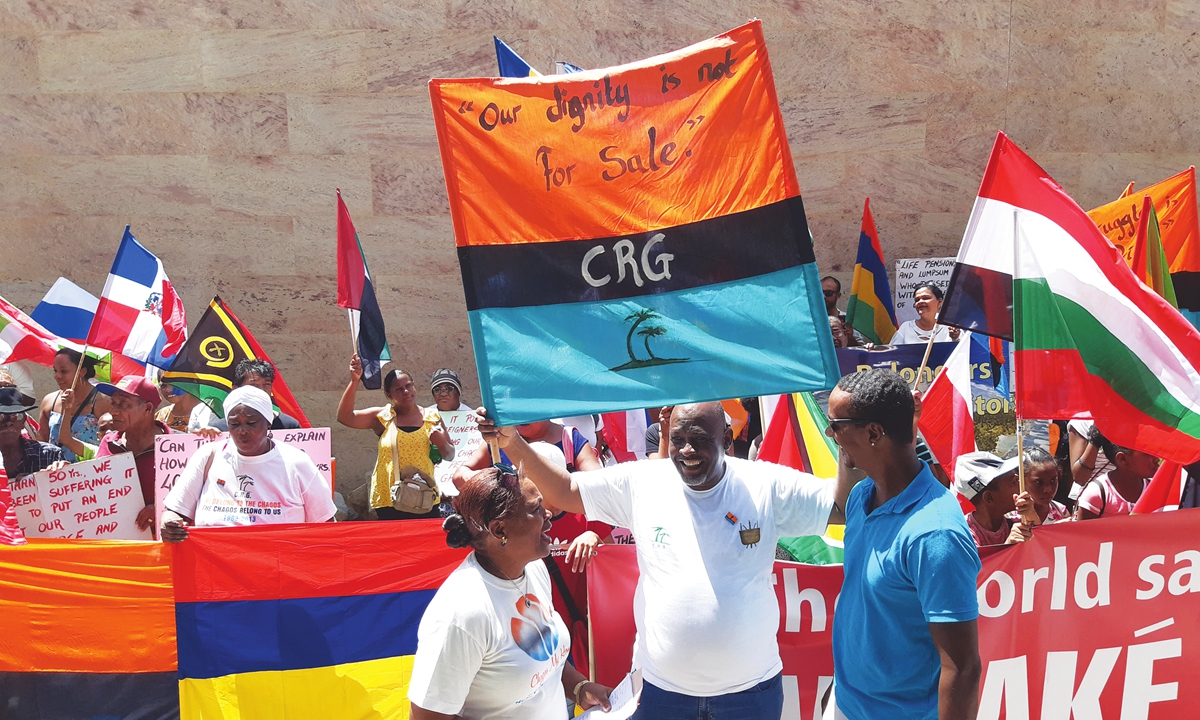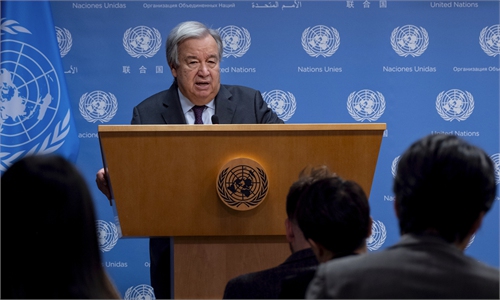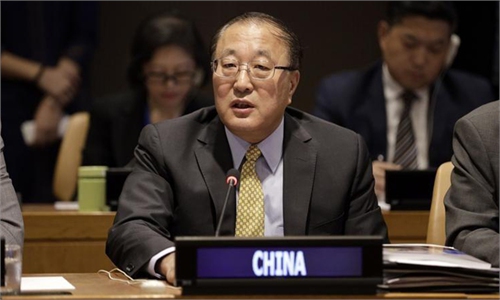
Demonstrators from the Chagos Islands protest at a British defiance of a United Nations deadline to end their "illegal occupation" of the Indian Ocean archipelago in Port Louis on November 22, 2019. Photo: AFP
Editor's Note:For Olivier Bancoult (Bancoult), no road leads home. Bancoult is from Chagos, a small archipelago in the middle of the Indian Ocean, formally known as the British Indian Ocean Territory. Bancoult lived in Diego Garcia, the largest island of the Chagos Archipelago. More than 50 years ago, Bancoult and his family, together with other inhabitants, were forcibly relocated over 2,000 kilometers away to Mauritius by the UK government to accommodate a US navy base. Over the years, as the leader of the Chagos Refugees Group, Bancoult has spoken to people around the world, asking them to support their struggle to return home and to be compensated. In her I-Talk show, Global Times (GT) reporter Wang Wenwen talked to Bancoult about his struggle and the injustices he has suffered at the hands of the US and the UK.
GT: How was life after you and your family were deported from Chagos to Mauritius?
Bancoult: Life was not so easy because it was very different to the place where we were used to living. The type of living was very different. First of all, everyone in Chagos has his own house, everyone has a job. We have our tradition and our culture, which is very different to Mauritius. Arriving in Mauritius, we had to face difficulties because we had to rent a house, and to rent a house you need to have money. The kind of job that we used to have in Chagos did not exist in Mauritius and therefore life was quite complicated for Chagossians.
GT: What do you think of the US and the UK forcing people out to build military bases?
Bancoult: I consider it to be a shame for them. If a country says it champions human rights, it should, above all, respect human rights. However, the UK and the US did not respect the lives of the Chagossians. What I can't understand is that the US and the UK, both superpowers and members of the United Nations General Assembly, were supposed to lead the world by example. However, they chose to violate the fundamental rights of our people.
I consider it racism. If you look at how the UK government treated the Forklanders and how the Chagossians were treated, the difference is incomparable. The Forklanders are white and they have blue eyes. We are black people, we are of African origin, and we came from slaves. I consider this discrimination. It's a violation of my dignity and my fundamental rights, which is unacceptable.
If we were white, we would have never faced this kind of problem. The UK government, together with the US, has ignored our fundamental rights. They voted for the Universal Declaration of Human Rights. Article 13 said everyone has the right to leave any country, including his own, and to return to his country. How could they themselves just ignore the human rights of the Chagossians?
We were born there, but we were expelled from there, while other people, who were not born there, are free to live and work there. They even declared us to be persona non grata, Tarzan and Man Friday. For them, we did not know about our rights and they never thought that one day, someone like me would go to the courts to start legal proceedings for the rights of my people.
Today in Diego Garcia, we have one US military base. It's a deal between the UK and the US. Only one third of Diego Garcia is being used as a US military base. Before Diego Garcia became a US military base, they all knew that there was a civilian population living in peace and harmony. The two governments agreed that a US military base would be built on Diego Garcia, the largest of the inhabited Chagos islands, and the island's inhabitants would be removed. And the UK even falsely declared that Chagos had no permanent population. It's totally untrue. The US has military bases all over the world. The inhabitants live in the vicinity of many of them. This is not the case on the Chagos Islands. This is a crime against humanity.
To take one example, in Guantanamo in Cuba, the locals live together with US military. In Okinawa, people live alongside the US military. They even employ skilled workers to come to the Chagos Islands to work in the base. This is discrimination. Our parents were buried there. We did not have access to the graves of our parents. In Diego Garcia, they have a cemetery for the military dogs, which is well maintained. But our parents' graves have been left derelict for so many years. How could we accept this?
GT: As you fight with the US and UK governments to return home, what difficulties have you met?
Bancoult: The difficulty we met is that when we tried to negotiate with the UK government and to correct all the injustices done to our people, it did not care for. For the UK government, it is as if we are guilty and they are innocent.
I have to go to the court to fight the case. Chagossian women have to go on hunger strikes, and protest. I've been arrested. We are still waiting. Even with an advisory opinion given by the International Court of Justice, who recognizes the sovereignty of Mauritius over Chagos, the UK and the US governments continue to illegally occupy the Chagos Archipelago and prevent Chagossians from going home.
We want to go and we will resettle in our place of birth. Even if they will kill us, we will go.
GT: You went to the US recently and talked to US lawmakers about this issue. What feedback did you get?
Bancoult: Most Americans know about Diego Garcia, but they don't know that Diego Garcia was a place where many Chagossians were born. I've told my story and my struggle to Congress representatives and asked for their support.
People are being more and more involved and saying that justice needs to be done. When I was in the US, I even had a meeting with an officer of the State Department. I told them that they are also guilty like the UK, because if there was no US military base on Diego Garcia, people would continue to live in peace. Because of the US military base, we have a nightmare, we have known all wrongs, and we have known all the injustices toward our people. The US must make reparations to our people. We are sending letters. We are asking for a resolution, talking to Congress so that more and more people know about the dirty work that had been done by the US with the compliance of the UK.
GT: How likely is it that the US and the UK will pay reparations and apologize?
Bancoult: We do not know, but we will continue to put pressure on them. Day by day, it's become very difficult and shameful for them. When they talk about supporting Ukraine, other countries ask them, what have you done for the Chagossians? They are supporting the Israelis, but they forget what happened to the Palestinians. They themselves are very huge countries, super big powers. They need to lead by example. They give advice to others, but they need to give good advice. They need to start with themselves to correct all the injustices that they did toward people who are still suffering.
We believe in our struggle, because our struggle is a just cause. We are not asking for more than what anyone else has. We are asking for something which every human being has the right to. That means the right to live, the right to breathe on the land of my birthplace. If not accessible to anyone we will accept this. But we cannot accept that everyone can live and stay on our birthplace, except for us natives. It's unfair. It's a crime against humanity by the UK and the US.
My pride is my struggle. My struggle is so important. Now it's become more and more known in the world. People are more and more concerned and involved in what happened to our people. This gives me the strength to continue. And I will never give up. Nelson Mandela was in jail for 27 years, but he never gave up his fight against apartheid.
Last year the UK and Mauritius opened negotiations. It's a good sign for us. But we hope to find a solution. The language used by the US in the past was that this is not their concern and we need to deal with the UK. Now they changed their position to say that they regret what happened to our people. That means that things are moving forward.
This is why we are hopeful. We represent the hope of all the displaced people all over the world, of all people who have been deported from their place of birth. One day, you will be able to go home.
GT: What do you think of the role of the US' overseas bases?
Bancoult: We have already been concerned about violence. We have never supported violence. We want people to live in peace, but unfortunately, our place is being used, sometimes to kill innocent people, which we do not support. We think it's time for them to put an end to this, let all people live in peace. This is our message. Why do you destroy people's lives? You need to find a solution to bring this to an end.


